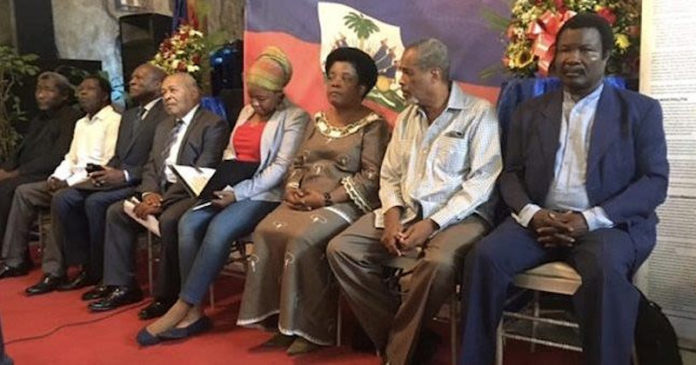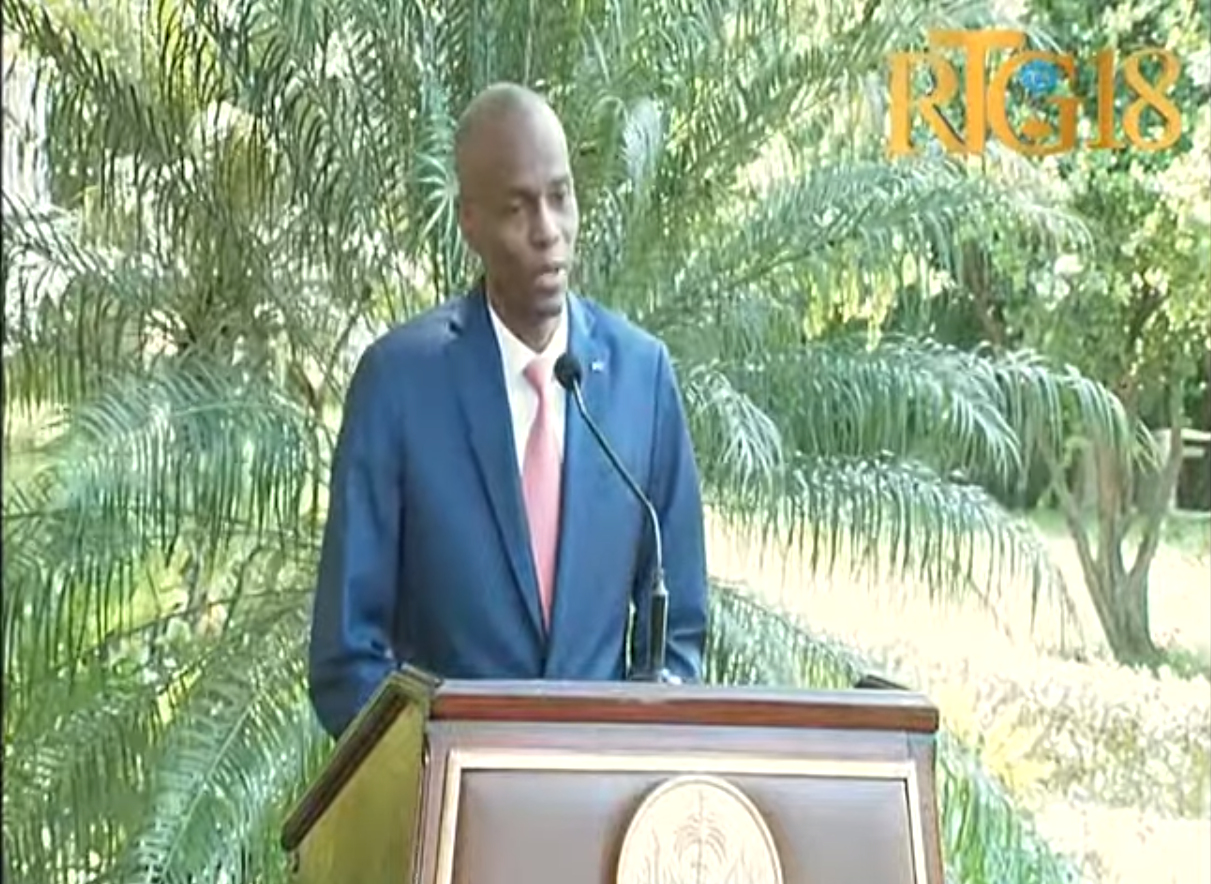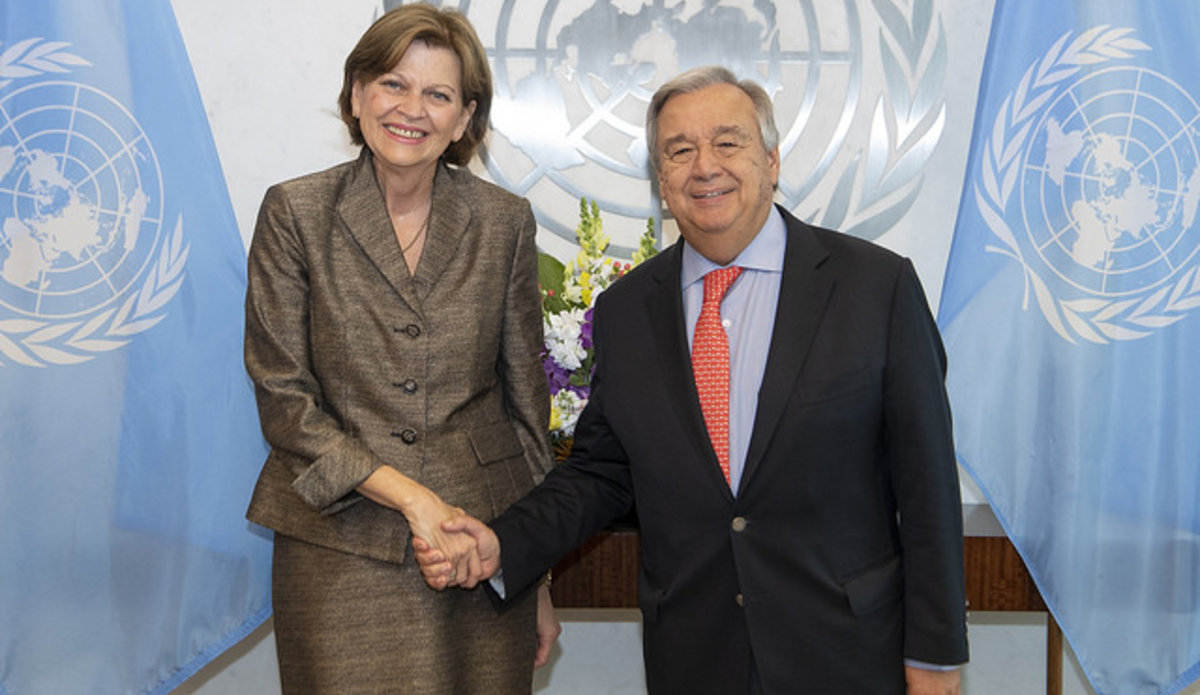
What happens when the unstoppable force meets the immovable object? In Haiti, the answer seems to be: you form a commission.
As calls for and anticipation of Haitian President Jovenel Moïse’s resignation become universal in the face of an ever-growing and determined nationwide revolt, two opposition fronts have each rolled out their own “transition commission” to navigate the rocky road to a provisional government and, possibly, a new constitution.
But, on Tue., Oct. 15, Moïse held a short outdoor press conference on the National Palace grounds to say that it would be “irresponsible” for him to step down. “Haiti doesn’t deserve this,” he said of the turmoil and misery gripping the country. “You voted for me to fight against a system,” he said, as if some unspecified “system” was responsible for Haiti’s woes, and he was fighting it.

His statement was reminiscent of “President-for-Life” Jean-Claude “Baby Doc” Duvalier’s declaration one week before his flight from Haiti on Feb. 7, 1986 that he was holding onto power “as strong as a monkey’s tail.” That now famous phrase was the final provocation that spurred the Haitian masses to redouble their protests and send him packing.
On Thu. Oct. 10 at the Terrace Garden Villa on the capital’s Delmas 75 road, the Consensual Alternative for the Refounding of Haiti (an opposition front previously known as the Democratic and Popular Sector) presented a nine-member “Commission for the Transfer of Power,” tasked with planning “the immediate and orderly departure of Jovenel Moïse.” They would propose three judges from Haiti’s Court of Cassation (Supreme Court), one of whom would act as Haiti’s temporary President. He would choose a Prime Minister (which Haiti hasn’t had since March) and propose, to the Consensual Alternative’s signatories, a list of possible ministers for the “Transitional Government,” which would have up to three years to organize elections.
The members of the Commission are: long-time political activist and university professor Antoine “Tintin” Augustin; journalist and sociologist Antoinette Duclair, a member of the Petrochallenger coalition and of Solidarity with Haitian Consumers; Baby Doc’s former lawyer Gervais Charles; radio owner Michel Legros, Union of Popular Forces leader, and, previously, of the anti-Duvalierist Haitian League for the Implantation of Democracy (LHID); former musician and Pétionville mayor Claire Lydie Parent; Father Michel Frantz Grandois, vice-president of the Creole Academie and representative of the Forces of the Progressive Opposition (FOP); former Limonade Deputy Hugues Célestin, leader of the Marien Patriot Initiative (IPAM); writer Gary Victor, representing infamous businessman Réginald Boulos’ Movement for the Third Way party; and former Haitian Army Col. Himmler Rébu, the leader of the Grand Rally for the Evolution of Haiti party (GREH), who served as President Michel Martelly’s Sports Minister.
The Consensual Alternative’s commission was announced two days after the Moïse regime had named it own seven-member “Dialogue Commission” on Oct. 8, with the following members: Michel Martelly’s last Prime Minister Evans “K-Plim” Paul; the General Coordinator of the Office of Management and Human Resources Josué Pierre-Louis; Jovenel’s former Tourism Minister Emilie Jessy Menos; presidential advisor and former Borgne deputy Jude Charles Faustin; current Secretary General of the Council of Ministers Rénald Lubérice; Haitian Bald Headed Party (PHTK) president Sainphor Liné Balthazar; and former army officer, senator, and Martelly Defense Minister Jean Rodolphe Joazile.

The regime’s commission was announced hours after Senate President and Jovenel ally Carl Murat Cantave issued a long, impassioned radio statement pleading that “dialogue is the one and only salvation for the resolution of our problems.” He called on President Moïse to put his mandate “on the table of dialogue, but also the mandates of elected officials of the Legislature and those of the Judiciary.”
The entire opposition rejected Moïse’s Dialogue Commission as too little, too late.
Finally, on Mon. Oct. 13, yet another transition shepherd was announced: the “Passerelle pour une transition” (Gateway for a Transition), a seven-member commission supposedly acting on behalf of 107 business, union, peasant, human rights, youth, and womens organizations which signed on to a “Joint Declaration for a National Rescue Government.”
The new front is ominously headed by perennial Washington ally and Episcopal Church Bishop Edouard Paultre, who is also the coordinator of the Haitian Council of Non-State Actors (CONHANE). The “Gateway for a Transition” and the Joint Declaration’s assemblage appear to be dominated by Haiti’s bourgeoisie and its business associations – Chamber of Commerce and Industry of Haiti (CCIH), Haiti Industries Association (ADIH), American Chamber of Commerce (AMCHAM), the Franco-Haitian Chamber of Commerce and Industry (CFHCI), and several regional chambers of commerce and industry.
The “National Rescue” front may be a spin-off of or merger with the Patriotic Forum of Papay, the Consensual Alternative’s previous opposition rival. The “National Rescue” counts among its 107 signatories Chavannes Jean-Baptiste’s Peasant Movement of Papay (MPP) and the National Peasant Movement of the Papay Congress (MPNKP) – also known as 4 G Kontre (Four Eyes Meet) – as well as Tèt Kole Ti Peyizan Ayisyen (Heads Together of Small Haitian Peasants), founded by the assassinated Father Jean-Marie Vincent. Chavannes’ cluster of organizations were the host and central organizer of the Aug. 27-31 conference which gave birth to the Patriotic Forum front.
The “National Rescue” front is clearly the new opposition heavy-weight, not just due to the leading role of Paultre and the bourgeoisie, but also the adherence of 51 unions, including the strategic transport and drivers syndicates, key to any general strike.
The seven “Gateway for a Transition” members are: businessman and CCIH president Frantz Bernard Craan, singer Carole Demesmin, authors Castel Germeil and Dr. Charles Manigat, university professors Sabine Manigat and Lemète Zéphyr, and Dr. Sofia Loréus.
In their declaration, the “National Rescue” front calls on Moïse and the Parliament to resign, for the restoration of public order, administration, and services, an “emergency program” for the “vulnerable” poor, “revival of economic activities… Putting public finances in order… Follow-up on records related to the management of Petro Caribe funds and other matters related to corruption and misappropriation of public property… Reorganization of the Electoral Council… Organization of a National Conference… Preparation and voting of a new constitution… Reform of the justice system” aimed at ending “the culture of impunity,” among other things. The group did not specify the details of how it saw the transition taking place or its goals being achieved.
Meanwhile, after over 15 years of deployment, the last United Nations “peace-keepers” finally left Haiti on Oct. 15. The unarmed United Nations Integrated Office in Haiti (UNHIN or, in French, BINUH) replaced the 1,300-police officer United Nations Mission to Support Justice in Haiti (MINUJUSTH). The Special Representative of the UN Secretary-General held over from MINUJUSTH to head UNHIN is Helen Meagher La Lime, a former career U.S. State Department officer who was most recently U.S. Ambassador to Angola (2014-2017) before joining the UN. La Lime is the first former U.S. diplomat to head UN missions in Haiti.

UNHIN has a one-year mandate to advise the Haitian government on ways to “promote and strengthen stability and good governance” and “to support the government in the areas of elections, police, human rights, prison administration, and justice system reform.”
Add to this explosive cocktail the growing size and ferocity of Haiti’s anti-Jovenel demonstrations. Marches, skirmishes, injuries, and deaths are occurring in towns around the country, but the largest actions are in and around Port-au-Prince, the capital.
On Fri. Oct. 11, marching protestors aimed to reach Moïse at his mountain home in Pèlerin 5 in order to “retrieve his resignation letter,” they said. This led to pitched battles en route in the upscale town of Pétionville between the police and demonstrators. Some protestors tried unsuccessfully to set fire to the fancy Kinam Hotel on the central square, St. Pierre Place.
Then, two days later, on Sun. Oct. 13, a giant multitude of tens of thousands turned out on the capital’s Delmas Road for a protest organized by Haiti’s musical artists. That demonstration’s tremendous size marked a new high-water mark for the popular tide relentlessly rising around the regime.









